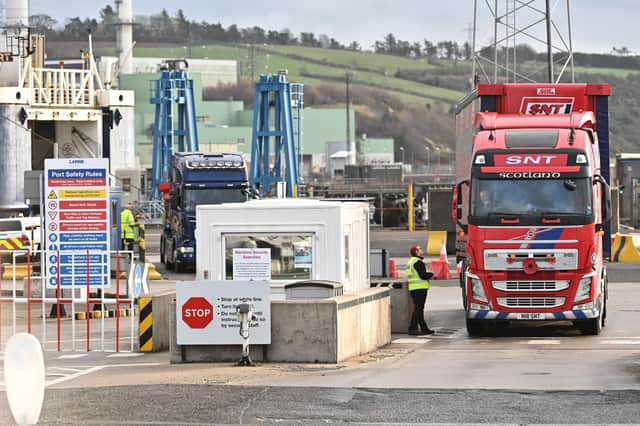Owen Polley: New prime minister needs to ignore the latest EU threats over Northern Ireland


Through its favourite journalists, bodies and other proxies, you can expect Brussels to threaten the government repeatedly in the coming weeks.
That is, unless the new prime minister capitulates and reverses or stalls plans to limit the damage caused by the Northern Ireland Protocol.
Advertisement
Hide AdAdvertisement
Hide AdLast week, an EU parliament trade committee, led by Republic of Ireland MEP Sean Kelly, encouraged the European Commission to impose “restrictions on trade, investment or other activities” on Britain, if the NI Protocol Bill continues passing through parliament.
At the time of writing, the result of the Conservative leadership election has not been announced, so we don’t know for sure who will be charged with responding to these tactics.
However, it seems overwhelmingly likely that Liz Truss will be the next prime minister and ‘kiss hands’ with the Queen at Balmoral on Tuesday. Like Rishi Sunak, Ms Truss suggested previously that she would prefer a negotiated settlement with the EU, but intends to press ahead with the protocol bill in case Brussels remains unresponsive.
That is an encouraging position for unionists, but it does not guarantee an early outcome. And they will have to watch carefully for any signs that the new PM’s stance is weakening.
Advertisement
Hide AdAdvertisement
Hide AdRecently, one of the European Commission’s favoured commentators tweeted that there will be “no negotiations, flexibility or creativity” from the EU, unless the government’s legislation is taken “off the table”.
Brussels frequently uses anonymous briefings with sympathetic journalists and pundits to threaten, cajole and otherwise influence British officials and the media. This classic of the genre claimed that the EU was not worried about the continued existence of the bill so much as the “government’s attitude to it”. The implication is that Brussels will not deal with Ms Truss if she tries to push the legislation through the House of Lords or accelerate its passage. This is important, because there is an expectation that europhile peers will launch a ‘full frontal assault’ on the government’s plans when parliament resumes, attempting to tie them up for ‘weeks and weeks’.
The Northern Ireland Secretary, Shailesh Vara, tried to pre-empt this action last week, by warning lords that they would contribute to the cost of living crisis here, if they delayed the bill.
The importance of that message was underlined by new statistics that reflect the damage that the protocol has already inflicted on Northern Ireland, even though it is, as yet, only partially implemented.
Advertisement
Hide AdAdvertisement
Hide AdThe Office of National Statistics released revised economic data that showed the province did not out-perform other regions of the UK last year, when the sea border was imposed, as was widely claimed.
Our performance, in fact, was significantly worse than that of England, Wales or Scotland.
Meanwhile, Her Majesty’s Revenue and Customs (HMRC) statistics revealed that companies made more than one million customs declarations during 2021, in order to ship goods from Great Britain to NI, even though those products never left the UK.
“Some businesses will spend longer completing just one form than it would take to fly from London to Belfast,” according to the financial secretary to the treasury, Lucy Frazer.
Advertisement
Hide AdAdvertisement
Hide AdIn the face of so much pro-EU, pro-protocol propaganda it is easy to lose sight of how extraordinary this situation is. An international border has already divided up the UK in important ways and Brussels wants to make that boundary deeper, more disruptive and more damaging.
If that were not enough, it is being supported in its designs, not only by nationalists, who are open about their ambitions to break up the UK, but by self-described liberals, lobbyists, British politicians and even certain business representatives.
The EU is currently pursuing legal action against the government that seeks, among other things, to stop the ‘grace periods’ on food and parcels that have kept life under the protocol here just about liveable.
The UK is supposed to respond to these threats by September the 15th.
Advertisement
Hide AdAdvertisement
Hide AdThere are suggestions that, if Liz Truss becomes PM, she will quickly trigger Article 16, the protocol’s emergency brake, to prevent any further disruption to trade and open an official arbitration process with the EU. That would at least be preferable to slowing down the protocol bill in response to Brussels’ demands.
In case you were in any doubt, the EU Commission has no intention of being reasonable about the Irish Sea border. If it had, it wouldn’t have launched such a provocative attack on British sovereignty in Northern Ireland in the first place.
The government has tried talking to the EU and even tolerated its constant aggression and stalling. These tactics will not be any more successful for a new PM. Whoever fills that role tomorrow must strongly resist Brussels’ attempts to derail action on the protocol.
Owen Polley August 29: Sunak reveals how the UK pandered to Covid panic
Owen Polley Aug 22: Unionists must try to push protocol to fore of London politics
Ben Lowry September 3: London will never treat SF as harshly as it will unionists